Article

Kara D. Federmeier, a professor of psychology who leads the Cognition and Brain Lab, will speak at the final fall Director’s Seminar at noon Dec. 12, in Room 1005 Beckman. Federmeier will discuss “Getting a Read on Language and the Brain.” Lunch is provided.
“Getting a Read on Language and the Brain”
A lynchpin of human cognition is the ability to rapidly and effectively link incoming sensory information to knowledge stored in long-term memory. Work in my laboratory — focusing on the cognitive and neural mechanisms that make this possible — has revealed the critical import of time and context for meaning processing. In particular, we have shown that the young adult brain addresses the temporal constraints inherent in language comprehension by actively using context information to predict features of likely upcoming words, an ability that makes use of left hemisphere mechanisms shared with language production. In this talk, I will describe some of what we have learned about the mechanisms — and limitations — of prediction in the context of comprehension. I will also show how prediction, and comprehension more generally, differs across the cerebral hemispheres and changes over the course of normal aging. Collectively, these findings reveal the complex relations among sensory processing, attention, memory, and control systems that allow people to rapidly and fluidly understand one another across the lifespan.
Speaker Biography
Kara D. Federmeier is a professor of psychology and the Neuroscience Program at the University of Illinois and a full-time faculty member at the Beckman Institute, where she co-leads the Illinois Language and Literacy Initiative and heads the Cognition and Brain Lab. She also recently served as the president of the Society for Psychophysiological Research. Her research, supported by the National Institute on Aging, examines meaning comprehension and memory across adulthood using human electrophysiological techniques, in combination with behavioral, eye tracking, and other functional imaging and psychophysiological methods. She earned her Ph.D. in cognitive science from the University of California, San Diego.
Beckman Institute for Advanced Science and Technology